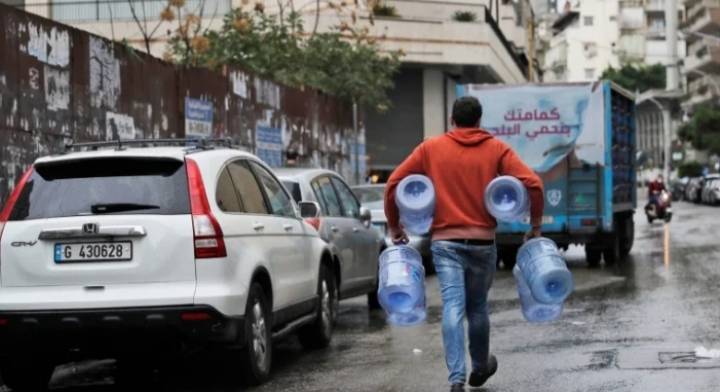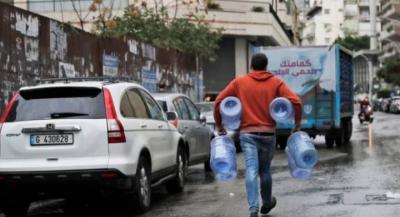The complete power outage continues at major pumping stations that require electricity, namely the Dbayeh, Jeita, Damour wells complex, Naameh, and the Mashraf station. This automatically leads to a water supply interruption in areas such as Metn Al-Aali, the coastal region, Bourj Hammoud, Ashrafieh, Bourj Abi Haidar, and Tel Elkhayyat. The issue extends beyond just the residents of these areas; residents of Bekaa, Kesrouan, Daroun, and Ghoushata are also pleading with the authorities as water has been cut off for a long time without anyone caring. The usual excuse given is the inability to cover the budget. This suffering is recurrent and exacerbates the financial and health conditions linked to the COVID-19 and cholera pandemics, pushing Lebanese citizens to spend part of their meager income on purchasing water that is often not sanitized.
**No Water, No Electricity**
Professor Eli, a resident of Ghadeer, Jounieh, confirms that the residents of the area have been suffering from water shortages for about a year. He continues: “On Christmas Eve in 2022, leading up to Christmas night in 2023, we have witnessed the same situation. I can only recall last year's celebration due to the water cut which forced us to have dinner using plastic plates.” He adds that his primary concern for his children and wife is securing water for the house, if it can be found. “How? Through a special pump at my home that pushes the water, making it twice as powerful in our tank. However, the problem lies in the absence of any drops of water most of the time.”
Regarding drinking water, he said, “I do not remember seeing drinking water for over a year. What saddened and shocked my friend and me was what happened last night in Dbayeh. We used to secure drinking water from the Dbayeh highway, the only place that could quench my children's thirst. For forty years, it has served me, but today I was saddened by the water cut even from this location, amid our most severe crisis. A gallon of water now costs 40,000 Lebanese pounds, which is a real problem since the budget does not allow for purchasing at least two gallons daily. In addition, the gasoline I would spend traveling from Jounieh to Dbayeh to secure water adds costs that we try our best to avoid.”
Eli concludes, “The problem isn’t just the lack of water supply or its cut-off, nor even the high cost of living; the major issue is that we are living a health and environmental crisis due to the spread of COVID-19 and cholera. Without using water in our homes, how does the situation look? Obviously catastrophic. Therefore, we urge the authorities to act immediately because our country, Lebanon, can no longer afford to close its lands and receive patients in hospitals that are struggling.”
In a conversation with "Ad-Diyar", Jean Youssef Gibran, General Director of the Beirut and Mount Lebanon Water Authority, states that “water is life and is the most critical element of life. Were it not for the rapid solutions devised to divide the many problems... the acute power cuts, the high cost of diesel, and the uncontrollable dollar rate making it very difficult to work, or to pay for spare parts for generators or stations, etc.” He adds, “There is a deadly frustration forming among workers and employees in the public sector as a result of declining salaries and rising fuel prices. The institution continues to struggle against collapse while ensuring the minimum water supply to subscribers, hoping for political and financial stability in the country.” Gibran concludes by stating, “As we've always said, water is present in its sources; the difficulty lies in transporting it to citizens due to everything mentioned earlier.”
In this context, Dr. Shadi Bashara, a specialist in infectious diseases, points out that water interruption leads to two outcomes: one related to bodily hygiene and the other related to the spread of bacterial diseases transmitted through contact. This can involve all viruses and bacteria that are communicated through contact, which will inevitably lead to disease transmission. Therefore, regardless of the type of disease or bacteria, such as COVID-19 and cholera, when hygiene decreases due to water cuts, this will undoubtedly cause a rise in bacterial diseases.
Regarding the solution to this matter, Dr. Bashara stated that it is the state's responsibility to secure water for citizens and subsequently ensure electricity because, with power cuts, water will naturally be cut off too. The state is accountable, and that’s where the infection risk lies.
When asked to what extent water cuts in Lebanon could increase the spread of cholera, he explained that there are two ways this virus spreads: first, cholera bacteria live in wastewater, so anything that contaminates wastewater spreads the disease automatically. Secondly, if a person who is infected does not wash their hands after using the bathroom and comes into contact with another person, this bacteria can be transmitted. Therefore, maintaining home hygiene is crucial to reducing or eliminating such infections among family members, as a sick person who cleans their hands and sanitizes the bathroom reduces the risk. However, if hygiene suffers due to a lack of water, the rate of infection among individuals will rise due to decreased personal cleanliness.
As for solutions, Dr. Bashara confirmed that the Health Ministry is providing vaccinations to people at a reasonable rate, especially in areas where cholera is prevalent, such as refugee camps and adjacent areas. This preventive method is essential in combating the spread of the disease. He concluded by saying that there seems to be some containment of cholera outbreaks recently, unlike the current COVID-19 situation, which has its unique transmission method that differs from cholera. Vaccination remains the only means to mitigate the spread of the epidemic.




